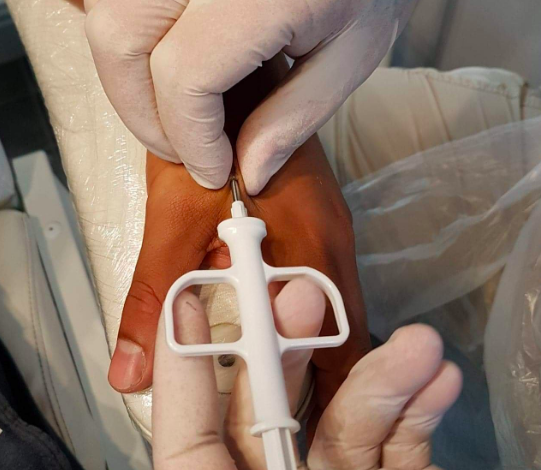
Implant or implode? Hacking your body
Biohacking has always attracted attention as chips in your body could solve so many logistics challenges with our ID access, for payment and health. In the future, we will probably not be required anymore to carry payment cards or other, external NFC chips as we are near making payments just by moving your hand over a standard payment terminal.
Walletmor.com is offering a replacement for bulky wallet, giving us a tiny, secure implant that offers a proximity payment function.
Once you set up a fully -fledged own account, Wallmor implant can allow us to store money in a number of currencies and pay with a wave of our hand.
Walletmor is not the first but one of the more recent updated version of that payment tool. Implants can be made from bio-safe, sterile materials and goes thru a number of tight safety tests to make sure the risk of infection may occur.
On the recent London Futurist event, Walletmor Founder and CEO, charismatic leader Wojtek Paprota has taken us thru the mesmerising potential of life with implants, how ecosystem will develop for implants, real-life applications.
VivoKey is Walletmor partner, and it is the biggest ecosystem for implants -another company is working on medical implant, as the implants will be specialised into Payment and Health/Others. At this point it appears we will need multiple implants.
From user perspective this is a challenge as unlikely we will agree to have a number of different implants. Ideally it should be one implant, multifunctional, that gets replaced every couple of years, or even better, be updated remotely, just like Tesla’s updates.
We got used to carrying mobile phones with us, something that back in 1989 was unthinkable.
David Rowe, CEO of the first Internet Provider in UK had one of the big mobile bricks early on, and we all thought this was just for Big Deal Makers. With the pace of developments of mobile, today we all have one mobile phone (or two if you need one for work) and people are surprised if you don’t have a mobile phone number.
The mobile phone number is de facto global ID, with trackable location and very intimate data supplier that the population at large appears to be accepting the tracking as long as they think what they obtain, is good enough to merit the exchange. This fast adoption of mobile phone would bode well in implant acceptability in near future.
One possible use could be extending the functionality into bio-alerts when the sensor is also detecting subtle changes in body chemistry like early cancer signs. Many people would be interested in having a home reader that they can wave their hand over and get an early reading. But this would need to be a different device with extra sensors, it would need a communication with external reader.
As mobile phones became more robust with time, we also can expect that implants will become more robust and will become standard equipment.
The current system is not Open Source, it needs to be developed in partnership with VivoKeys to enable functionality. Again, something that may need to change in the future.

Risks
There is clearly a risk of theft – someone may be motivated to cut off finger from an individual that is perceived wealthy. London has had a couple of years spat of mobile phones thieves on mopeds that got very good in snatching mobiles from the hand of a pedestrian. They particularly targeted young teens and women, often pushing them off the payments by the bike and grabbing the phone as the victim was trying to balance themselves.
There is also an issue with the risk if Identity Theft – one that would be much harder to prevent if the signal of the sensor can be copied.
Finally, some employers have already been exploring use of implants for security in the offices, as shown by Prof Phoebe Moore in her book Quantified Self at Work. We would need to be very careful to introduce legal framework – to avoid mandatory implants use and maintain freedom of choice for individuals who do not want an implant but do now want to be discriminated against.
Mitigation of fraud can be done by Freeze option of the implant which then disables the functionality of the device and can be made inactive in an instance.
The bottom line is that implant technology is here, and may help in minimising costs of Identity tools an health monitoring. We expect to see mass use of health implants within the next two years, where your body changes can inform the implant and your home implant reader provides interpretation of the changes.
Our bodies have very poor signalling systems, for example, a toothache is painful but not dangerous. Cancer is a silent killer that develops quietly for years, only to surface when it is often too late for remedy. Once the acceptability of monitoring implants becomes a norm for health, the payment option will probably follow swiftly and the scale of demand will lower the current price of the implant (199 pounds).
Resources
15% Discount Code: Futurist
You can buy the implant and the set including the needle) on walletmor.com – for more specific questions contact: [email protected]
Other biohack implants
https://www.bioteq.co.uk/index.php/implants
List of implants projects since 2003:
https://dangerousthings.com/product/vivokey-spark/
History and they key research people from Cybersalon.org




